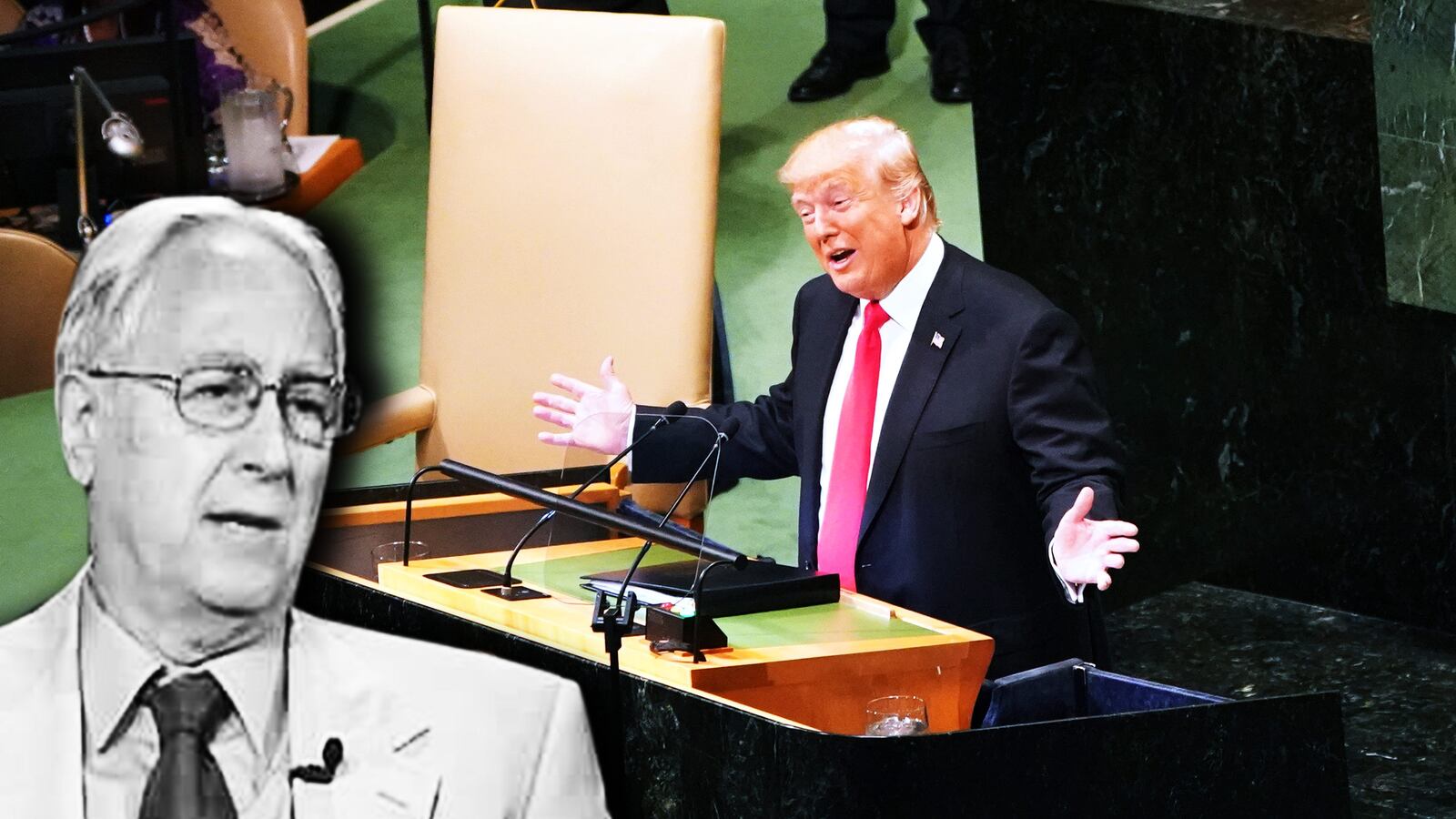There was a critical word tucked into Donald Trump’s U.N. speech that went largely unnoticed but could have profound geopolitical implications, to the degree it reflects his and his teams’ thinking. That word is “sovereignty,” and we should all understand what the president means when he invokes it.
In his speech, Trump announced that America “will not be held hostage to an old, discredited ideology and experts that have been proven wrong over the years.” The ideology he is referring to is “globalism,” which he emphatically rejects. And in its place, he embraces the “ideology of patriotism.” It seems that international relations are a zero-sum game. If one believes globalism was responsible for lifting many nations out of poverty and that it was a positive gain for the world, one is not a patriot.
Trump’s speech was written by the most ideological member of his White House staff, Stephen Miller, whose perspective is essentially that of the ousted Steve Bannon. The former chief White House strategist is currently in Europe trying to build what he calls “the Movement,” an alliance of the new “illiberal” and populist-nationalist nations like Poland and Hungary, which are moving to adopt sovereignty as their governing principle in reaction to what he sees is the elitist dictatorship of the EU.
The case for sovereignty has been made most succinctly in a book that Miller is surely familiar with, John Fonte’s Sovereignty or Submission? Will American Rule Themselves or be Ruled by Others? This position also advocated by John O’Sullivan, who is a former editor of National Review who wrote the introduction to Fonte’s book as well as columns in praise of “national conservatism.” As Trump said in his speech, “We will never surrender America’s sovereignty to an unelected, unaccountable body”; America will remain “governed by Americans.” For that reason, he and John Bolton favor pulling the United States out of the International Criminal Court, which Trump says, “claims near universal jurisdiction over the citizens of every country.”
Trump emphasized trade as an area where America must assert its sovereignty, which brings us to China. He believes that waging a tariff war will address the imbalance that was in China’s favor. Moving China into the World Trade Organization, he argues, allowed China to gain advantage over the United States. China rigged the system, Trump told the U.N. and announced that “Those days are over.” Workers would “no longer be victimized,” and U.S. companies will no longer “be cheated” and America’s wealth “plundered and transferred.” America will make no apologies for what it is doing, and “will always act in our national interests.”
Trump assumes U.S. programs like “military protection,” such as those that put U.S. troops in South Korea, are only benefiting the recipient country and not the United States. The United would no longer “put up with it,” he asserted, and would not pay the “horrible prices” it costs America for efforts that only serve those of the recipient nation. Somehow, he fails to comprehend that creating stability in a region and making it clear that aggressive nations must stop and think before they endanger the world’s peace is not something that harms American interests, but benefits the United States.
It sounded very nice when Trump said “I honor the right of every nation in this room to pursue its own customs, beliefs, and traditions. The United States will not tell you how to live or work or worship.” But this positive-sounding statement has darker consequences. Trump’s promotion of isolationism and nationalism implicitly gives support to authoritarian repressive and populist-nationalist governments that are moving away from democracy and a free civil society. This is the case with the growing authoritarian steps taken by the Polish government. “In Poland,” Trump stated, “a great people are standing up for their independence, their security, their sovereignty.” Fortunately, The Atlantic in its new issue features a lengthy—and quite grim—assessment of today’s Poland by Anne Applebaum, who lives in that country, and where her husband was the former foreign minister. It would have served Miller and Trump well had they read it before he made his remarks.
Applebaum shows in chilling detail precisely what autocratic changes the ruling Law and Justice Party has made in Poland since its victory at the polls. Ruling with a slight parliamentary majority, she points out, it violated its own constitution by putting new pro-regime judges on the constitutional court, and then attempted to pack the Supreme Court so its rulings would favor the current regime. (On Monday, the EU sued Poland for steps it has taken to undermine an independent judiciary.) It then did what the old totalitarian powers always did first—take over the government radio station and get rid of independent reporters.
One would expect an American president to praise the institution of democratic rule in nations that were ruled in the past by both the Nazis and then the communists, but instead, Trump has praised them. He did not mention Hungary, but it’s likely Miller had Victor Orban and his Fidesz Party in mind when he wrote, and Trump said, that each sovereign nation should concentrate on “upholding national borders, destroying criminal gangs,” and “set[ting] its own immigration policy in accordance with its national interests.” What Trump means is that all nations should echo his immigration policy in the United States.
The essence of Trump’s speech is an assault on the very concept of the international liberal order that has guided the West to security and the creation of democracies that had been overthrown during the war and in the post-war era. His claim that all nations are “bound together by a shared past and working toward a common future” is false. Each day brings more news of a drift to authoritarianism, and a growth in the strength of far-right parties whose entire raison d’etre is anti-democratic.
Perhaps it was not so strange that Trump did not mention Russia or Vladimir Putin, even while attacking Iran for its armed intervention on the side of the Assad regime in Syria. Trump spoke soon after Russia announced its sale to Syria of the S-300 surface-to-air missile system, that Assad could use in a final offensive to destroy the remaining center of resistance. Yet Trump ignored Putin’s role in aiding the destruction of Syria and the murder of its remaining citizens who live in opposition areas.
His speech is perhaps more evidence for Robert Kagan’s claim that “the old consensus about America’s role as an upholder of global security has collapsed,” and that the doctrine of “America First” has triumphed. Kagan warns that this change is what kept America “on the sidelines while fascism and militarism almost conquered the world.” Trump’s speech is unfortunately evidence that Kagan gets it right.





